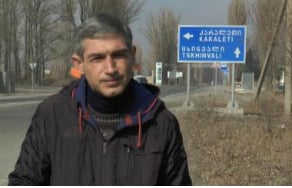“There are always interesting things going on in the conflict regions of Georgia, however, the Georgian media seems to greatly focus its attention to only events taking place along the border,”- Radio Freedom Shita Kartli correspondent, Goga Aptsiauri, says. The conflict between Georgians and Ossetians is the main specialization of his activity, where he has a multi-year experience.
An interview with the journalist was conducted near the conflict zone. The conversation started with a general question regarding the way the Georgian media covers territorial conflict and its related issues. According to Aptsiauri, the Georgian media is only “chasing” after high-rated events, paying less attention to the coverage of human stories and real problems of the region.
“It would be a good thing if media took interest in the way people live in the villages of the occupied territories, and challenges they’re facing. I know the region has difficulties with irrigation and drinking water, as well as with firewood, especially in winter, as the forests supplying those people are in the occupied zone. The media, however, is more interested in sensations,”- the journalist says.
The issue of forcibly displaced persons is also attached to territorial conflicts. Georgian media was covering the issues related to the Russian-Georgian war of 2008. Today media organizations are covering refugee-related issues within the context of politicians’ image campaigns.
“There are only a couple of media outlets paying attention to the issues of the refugees,”- the journalist stressed, and added that “the refugees have a great variety problems, e.g. the walls of the cottages in the German built Verkhvebi settlement for IDPs are totally cracked. Have you ever seen any media outlet coving the given issue? Our radio Freedom is covering the issue to a certain extent, so do some local channels, but the central media seems to disregard similar topics.”
Goga Aptsiauri believes that the main problem of media in relation to the coverage of conflicts was pressure on the part of the government, which has changed today, and now its way easier to access the conflict regions.
Nonetheless, the lack of information and sources still remain an“Achilles heel” for the Georgian media.
“Being inadequately informed is the main issue of media today. I understand it’s very hard to communicate with the society living in the occupied territory. Therefore, the product made by Georgian media usually becomes partial, due to being based on only one source. In most cases, materials transmitted by the governmental sources are copied by journalists that don’t have an opportunity of verification. When a problem emerges in Tskhinvali, I always contact my colleagues, Irina Ianovskaia and Temur Tskhovrebov, and learn from them about the viewpoints of the people from the other side,”- Aptsiauri stressed.
According to him, it’s important that representatives of the government and journalists are cautious with choosing words when covering conflicts.
“Ossetian criminals- I frequently hear the given term. “Each concrete criminal has his own name, and making emphasis on the ethnicity makes a stereotype marking Ossetians as criminals. I believe that the media must take part in shattering those stereotypes,”- Aptsiauri said.
The use of hate speech when covering conflicts is a significant problem of media. Sometimes media representatives use such wordings accidentally, or due to the lack of professionalism. However, there are times when they do it deliberately. It’s should be stressed that hate speech in the coverage of conflicts is more frequently used by the press, rather than by televisions.
“I’ll recall one incident. An Ossetian youth came to one of the meetings and acquainted himself to us, Georgians. We engaged in a conversation, dined together, and then he said: Now I realize that Georgian aren’t the bloodthirsty persons I was told. Now you can imagine the importance of private relationships for that matter. I think civil society representatives and journalists must make efforts to gradually shatter those stereotypes and hate speech”.
By the end of the meeting the conversation touched upon the role of media in a conflict situation. Goga Aptsiauri’s viewpoint suggested media’s great role in the developments of a conflict, as it represents a conductor of information. He said that the Georgian media rarely makes stories on positive facts, taking more interest in negative and scandalous events, and that the solution here is to spread information verified against various sources.






